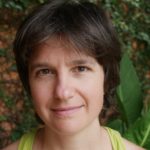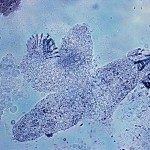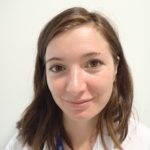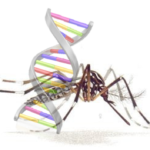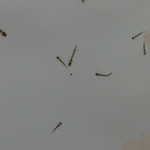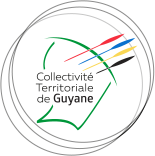Our laboratory is based at Institut Pasteur de la Guyane, in French Guiana (a region of France located in South America). We are studying how the mosquito microbiota affects its host and impacts disease transmission.
Our focus: The bugs in the bug…
We are interested in microbes harbored by mosquitoes (microbiota), which help them or prevent them from transmitting diseases such as malaria or dengue fever. Mosquitoes who transmit parasites or viruses get infected by feeding on an infected host. The parasite or virus will only be transmitted if it makes it through several selective steps and if the mosquito survives beyond the pathogen’s incubation period. Mosquito permissiveness to infection and lifespan are both affected by the mosquito microbiota.
For instance, the microbiota of malaria vectors limits the infection success of parasites via immune induction and production of antiparasitic molecules and it also reduces mosquito lifespan. As such, the microbiota may reduce the risk of parasite transmission. Inversely, some bacteria and fungi increase the chance of dengue virus to make it in the mosquito gut. Microbes are useful for the development of mosquito larvae, whether considering vector of malaria parasites or of dengue virus. These features suggest some positive impact on transmission.
Our approach: Combining the field and the lab
In our lab, we want to understand how bugs (mosquitoes), bugs (bacteria) and bugs (parasites/viruses) interact by studying the immune and metabolic pathways involved. But here’s a major problem in our field: the microbiota composition in lab mosquitoes is very different to that of wild mosquitoes. We are taking advantage of our location in French Guiana to combine field and lab research. In the field, we collect mosquitoes to study their microbiota and/or culturing some of their bacteria. In the lab, we are developing innovative protocols to manipulate microbiota composition and produce lab mosquitoes with a field-type microbiota as well as germ-free mosquitoes. This will allow us to perform functional studies on a relevant lab model.
Our bugs
We are interested in the two main mosquito vectors present in French Guiana and in the pathogens that they transmit.
- Anopheles darlingi, the main malaria vector in South America, which colonizes the whole Amazon basin. This vector of Plasmodium falciparum and vivax is yet poorly known as it is very difficult to maintain as a lab colony.
- Aedes aegypti, the main vector of arboviruses (arthropod-borne viruses) worldwide, which is present in and beyond the intertropical area. This mosquito transmits dengue, yellow fever, chikungunya and Zika viruses.
We collect these mosquitoes in a diversity of sites in French Guiana, the closest one being on campus for Aedes aegypti, the most remote ones being only accessible by boat, for instance Trois Palétuviers on the Oyapock river, where we collect Anopheles darlingi.
Our lab is based in Vectopole Amazonien Emile Abonnenc at Institut Pasteur de la Guyane (Cayenne), a state-of-the-art entomology facility equipped with biosafety labs (BSL2, BSL3) to perform mosquito infections with human pathogens (including P. falciparum, chikungunya, dengue and Zika viruses).
Impact on human health
Our basic research aims to identify new strategies to block the transmission of malaria parasites or arboviruses. For instance, we may discover new targets for transmission-blocking drugs or vaccines (human treatments that, when present in the ingested blood, interfere with pathogens in the mosquito) or microbes that impede the development of transmitted pathogens into the mosquito.
